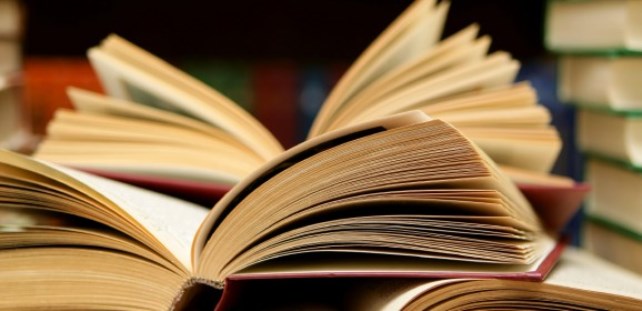
Helpful Books on Addictions
Self-Help Books
Currently you can find more than 30 self-help books offering programs that can be used as alternatives to the 12-Step Approach. Here are a few notable options with brief descriptions:
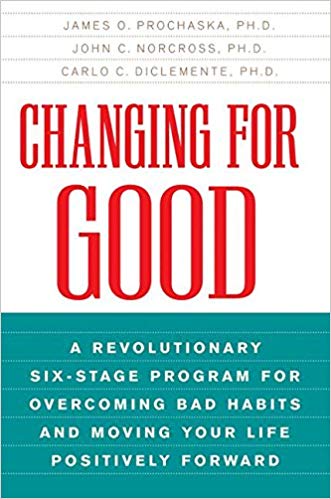
Changing for Good: A Revolutionary Six-Stage Program for Overcoming Bad Habits and Moving Your Life Positively Forward
By James Prochaska, Ph.D., John Norcross, Ph.D., and Carlo DiClemente, Ph.D. New York: Morrow, 2007.
Based on 12 years of research and more than 50 studies involving more than $35 million in research funding, this book offers a new paradigm for self-change with a proven high success rate. Reviews the six stages of change and helps you transition from one stage to the next. (Click here for an Extended Review.)
See more details at
Amazon.com
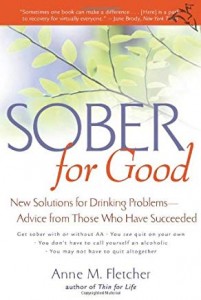 Sober for Good: New Solutions for Drinking Problems — Advice from Those Who Have Succeeded
Sober for Good: New Solutions for Drinking Problems — Advice from Those Who Have Succeeded
By Anne M. Fletcher, M.S., R.D. Boston, MA: Houghton Mifflin Harcourt, 2002.
Weaving together the success stories of ordinary people and the latest scientific research on the subject, Fletcher uncovers a vital truth: no single path to sobriety is right for every individual. There are many ways to get sober – and stay sober. The author is a registered dietitian who has counseled hundreds of clients in clinical settings. She also has served as the executive editor of the Tufts University Health and Nutrition Letter and as a contributing editor for Prevention magazine.
Help Yourself: A Revolutionary Alternative Recovery Program
By Dr. Joel C. Robertson. Nashville: Thomas Nelson, 1992.
Dr. Robertson, Director of The Robertson Institute, Ltd., in Michigan, specializes in neuropharmacology (brain chemistry technology). His book serves as an in-depth workbook which will help you at all levels: physical, mental, emotional, and spiritual. After you determine your personal nature, you choose techniques to meet your specific needs.
Rational Madness: The Paradox of Addiction
By Ray Hoskins. Blue Ridge Summit, PA: Tab Books, 1989.
This book presents an enlightened view of addictive behavior. When you peel away one layer of addiction (such as alcohol or drug addiction), you find other layers of addiction (for instance, food addictions, various mental compulsions, as well as behavior addictions,” such as the addiction to work, gambling, sex, relationships). The book offers techniques, primarily psychological and spiritual, to help you work through these layers of addiction and become free.
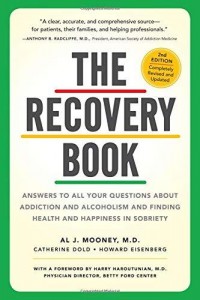 The Recovery Book: Answers to All Your Questions About Addiction and Alcoholism and Finding Health and Happiness in Sobriety
The Recovery Book: Answers to All Your Questions About Addiction and Alcoholism and Finding Health and Happiness in Sobriety
By Al J. Mooney, M.D., Arlene Eisenberg, and Howard Eisenberg. New York: Workman, 2014.
This 600-page guidebook looks at all aspects of recovery. In it, the 12-Step Programs get mentioned often as a recovery technique, but the book also answers hundreds of questions about recovery in non-12-Step terms. You’ll find that this book serves very much as an encyclopedia, covering the entire recovery field with useful information and state-of-the-art advice.
Recovery from Addiction
By John Finnegan and Daphne Gray. Berkeley, CA: Celestial Arts, 1990.
The authors urge a whole person approach to recovery and give suggestions to guide the reader. This book presents a strong dietary plan, along with some recipes for you to try. It also includes nutritional and herbal therapy to help treat various medical problems that you encounter in recovery.
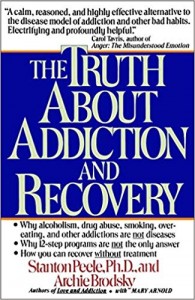 The Truth About Addiction and Recovery: The Life-Process Program for Outgrowing Destructive Habits
The Truth About Addiction and Recovery: The Life-Process Program for Outgrowing Destructive Habits
By Stanton Peele, Ph.D. and Archie Brodsky with Mary Arnold. New York: Simon & Schuster, 1992.
With the Life Process Program, you assess the impact of addictions on your life. Then you look at what’s really important to you. By doing so, you can answer the question, “Do I need to make a change?” If yes, the book gives you a set of guidelines for changing behavior, including “Life Skills” training. This book offers a Lifestyle-Change Approach to quitting addictions, an approach that has proven extremely effective in numerous studies.
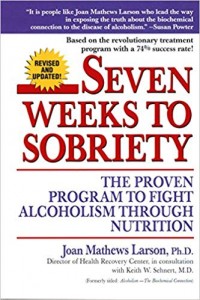 Seven-Weeks to Sobriety: The Proven Program to Fight Alcoholism through Nutrition
Seven-Weeks to Sobriety: The Proven Program to Fight Alcoholism through Nutrition
By Joan Mathews Larson, Ph.D. New York: Ballantine Books, 1997
Joan Mathews Larson is the Director of Health Recovery Center in Minneapolis and she uses this program with clients at the center. Called a “biomedical regimen for recovery,” this program offers a strong component for physical healing. Through diet and dietary supplements, you can heal the body, eliminate addictive cravings, and even solve problems with mood, such as depression.
A History of Addiction and Recovery in the United States
By Michael Lemanski
In this book, Michael Lemanski traces the history of addiction treatment in America. He reveals the results of scientific studies which demonstrate the extremely low success rate of AA. Then asks why do 94% of the inpatient addiction treatment facilities in the U.S. rely on the 12-Step method. The answer is at once alarming and enlightening. (For a more thorough review, click here.)
Overcoming Your Alcohol, Drug, and Recovery Habits: An Empowering Alternative to AA and 12-Step Treatment
By James DeSena
This book brims with a point by point analysis of the 12-Step movement and with its myriad problems. James DeSena tells what these problems look like and how to overcome them. He offers numerous alternative treatment methods that can be used instead. As an example, he even challenges the age-old idea of HALT (Hungry, Angry, Lonely, Tired). Traditional treatment advice says “watch out for times when you’re hungry, angry, lonely, or tired. These may be times when you might relapse.” But DeSena flips it, and reasonably so, saying this actually gives you a few more excuses for drinking or using. And who needs more excuses? Clearly, in the course of any given day, you’re bound to experience one of these conditions at least once. Furthermore, he points out, none of these would necessarily lead to drinking or using. Each would lead more naturally to something else. Think about it. When hungry, we can eat. When angry, we can take an energetic walk or yell at the moon. When lonely, we can call somebody or read a book. When tired, we can sleep.
Recommended Books for Information on Drugs of Abuse
For some accurate and helpful information on drugs of abuse, check the following…
Buzzed: The Straight Facts About the Most Used and Abused Drugs from Alcohol to Ecstasy
By C. Kuhn, S. Swartzwelder, and W. Wilson. New York: W.W. Norton, 2014.
Drug and Alcohol Abuse: The Authoritative Guide for Parents, Teachers, and Counselors
By H.T. Milhorn. New York: Plenum Press, 1994.
From Chocolate to Morphine: Everything You Need to Know About Mind-Altering Drugs
By A. Weil and W. Rosen. New York: Houghton-Mifflin, 1993.
Street Drugs (revised edition)
By A. Tyler. London: Hodder and Stoughton, 1995.
Books to Help with Self-Help Group Programs
For SMART Recovery:
There are many helpful books for this program. Try:
- Alcohol: How To Give It Up And Be Glad You Did by Dr. Philip Tate
- Sex, Drugs, Gambling, & Chocolate: A Workbook for Overcoming Addictions by Dr. A. Thomas Horvath.
For SOS Recovery:
Books by SOS Founder James Christopher include:
- How to Stay Sober (Prometheus Books, 1988)
- Unhooked (Prometheus Books, 1989)
- SOS Sobriety (Prometheus Books, 1992).
For Women for Sobriety:
Jean Kirkpatrick founded this organization in 1991. Two of her books have been highly influential in the addiction treatment field and to women in particular. They are:
- Turnabout: New Help For The Woman Alcoholic (Barricade Books)
- Goodbye Hangovers, Hello Life.

